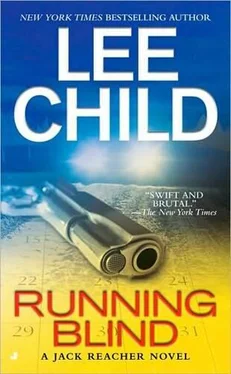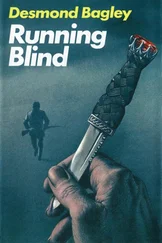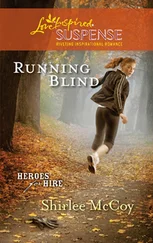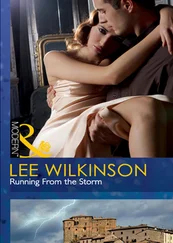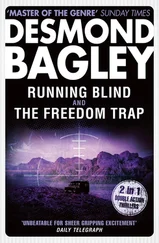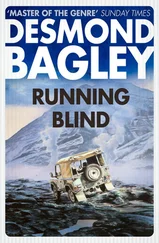You get a partial view. The driver’s window is down on both cars. There’s a brown paper sack and a closed cup of coffee. The new guy lifts them across the gap, elbow high to keep them upright. You adjust the focus on the field glasses. You see the waiting cop reach out. The scene is flat and two-dimensional and grainy, like the optics are at their limit. The cop takes the coffee first. His head turns as he finds the cup holder inside. Then he takes the bag. He props it on the ledge of his door and unrolls the top. Glances down. Smiles. He has a big, meaty face. He’s looking at a cheeseburger or something. Maybe two of them, and a wedge of pie.
He rolls the top of the sack again and swings it inside. Almost certainly dumps it on his passenger seat. Then his head is moving. They’re chatting. The cop is animated. He’s a young guy. The flesh of his face is tight with youth. He’s full of himself. Enchanted with his important mission. You watch him for a long moment. Watch the happy expression on his face. Wonder what that face will look like when he walks to her door for a bathroom break and gets no reply to his knock. Because right there and then you decide two things. You’re going in there, to do the job. And you’re going to work it without killing the cop first, just because you want to see that expression change.
THE NISSAN MAXIMA was briefly a drug dealers’ favorite ride, so Reacher felt OK about using it to get out to the Jersey bar. It would look innocent enough parked in the lot. It would look real . Unmarked government cars never did. A normal person spends twenty grand on a sedan, he goes ahead and orders the chrome wheels and the pearl coat along with it. But the government never did, so their cars looked obvious, artificially plain, like they had big signs painted on the side saying this is a police unmarked . And if Bob saw such a thing in the lot, he’d break the habit of a lifetime and spend his evening someplace else.
Reacher drove. Harper preferred not to, not in the dark and the rush hour. And rush hour was bad. Traffic was slow up the spine of Manhattan and jammed at the entrance to the tunnel. Reacher played with the radio and found a station where a woman was telling him how long he was going to have to wait. Forty, forty-five minutes. That was about twice as slow as walking, which was exactly how it felt.
They inched forward, deep under the Hudson River. His backyard was sixty miles upstream. He sat there and traced its contours in his mind, testing his decision. It was a nice enough yard, as yards go. Certainly it was fertile. You turned your head, the grass was a foot high when you turned it back. It had a lot of trees. Maples, which had been cute in the early fall. Cedars, which Leon must have planted himself, because they were placed in artful groups. Leaves came off the maples and little purple berries came off the cedars. When the leaves were down, there was a wide view of the opposite bank of the river. West Point was right there, and West Point had been an important part of Reacher’s life.
But he was not a nostalgic guy. Part of being a drifter means you look forward, not backward. You concentrate on what’s ahead. And he felt in his gut that a big part of looking ahead was looking for newness . Looking for places you hadn’t been and things you hadn’t seen. And the irony of his life was that although he had covered most of the earth’s surface, one time or another, he felt he hadn’t seen much. A lifetime in the service was like rushing down a narrow corridor, eyes fixed firmly to the front. There was all kinds of enticing stuff off to the sides, which you rushed past and ignored. Now he wanted to take the side trips. He wanted a crazy zigzag, any direction he felt like, any old time he wanted.
And returning to the same place every night wouldn’t do it. So his decision was the right one. He said the words to himself. Sell the house. The house is on the market. The house is for sale. The house is sold . He said the words and a weight came up off of him. It wasn’t just the practical weight, although that was important. No more fretting about leaks in the pipes and bills in the mail and oil deliveries and insurance coverage. It was the release . Like he was back in the world, unburdened. He was free and ready to go. It was like a door opening and sunlight flooding in. He smiled to himself in the thrumming darkness of the tunnel, Harper at his side.
“You actually enjoying this?” she said.
“Best mile of my life,” he answered.
YOU WAIT ANDand you watch, hour after hour. Perfectionism like that, you don’t find everywhere. But you are perfect, and you have to stay perfect. You have to stay sure. And by now you’re sure the cop is a permanent fixture. He eats in his car, he uses her bathroom from time to time, and that’s it. So you think about hijacking the cop, maybe tomorrow morning, just before eight o’clock, and impersonating him. Replacing him on duty. You think about sitting in his car for a spell and then walking up to Scimeca’s door and knocking, like you were ready to relieve yourself. You think about that for around a second and a half, and then you reject it, of course. His uniform wouldn’t fit. And you’d be expected to chat with the Bureau guy at the eight o’clock handover. He’d know you were a fake, straight off the bat. It’s not like he’s dealing with a big anonymous police department like he’d get in New York or L.A.
So either the cop has to be moved, or you have to go in right past him. At first you toy with the idea of a diversion. What would it take to get him out of there? A major automobile accident at the crossroads, maybe. A fire in the school, perhaps. But as far as you know the village doesn’t have a school. You’ve seen yellow buses on the road, heading in and out toward Portland. The school is probably in another jurisdiction. And an automobile accident would be hard to stage. Certainly you’re not about to involve yourself in one. And how do you induce two other drivers to get in a crash?
Maybe a bomb threat. But where? At the station house? That would be no good. The cop would be told to stay where he was, safely out of the way, until it was checked out. So where else? Some spot where people are gathered, maybe. Somewhere the whole police department would be needed to handle the evacuation. But this is a tiny place. Where do people gather? The church, maybe. You can see a spire, down near the through road. But you can’t wait until next Sunday. The library? Probably nobody in there. Two old dears at most, sitting there doing their needlepoint, ignoring the books. Evacuation could be handled by the other cop on his own in about three and a half seconds.
And a bomb threat would mean a phone call. You start to think about that. Where from? Calls can be traced. You could head back to the airport in Portland and call from there. Tracing a call to an airport pay phone is the same thing as not tracing it at all. But then you’re miles out of position at the critical time. A safe call, but a useless call. Catch-22. And there are no pay phones within a million miles of where you’re crouched, not in the middle of the damn Rocky Mountains or whatever the hell they call them. And you can’t use your mobile, because eventually the call would appear on your bill, which ultimately is the same thing as a confession in open court. And who can you call? You can’t allow anybody to hear your voice. It’s too distinctive. Too dangerous.
But the more you think about it, the more your strategy centers around the phone. There’s one person you can safely let hear your voice. But it’s a geometric problem. Four dimensional. Time and space. You have to call from right here, in the open, within sight of the house, but you can’t use your mobile. Impasse.
Читать дальше
